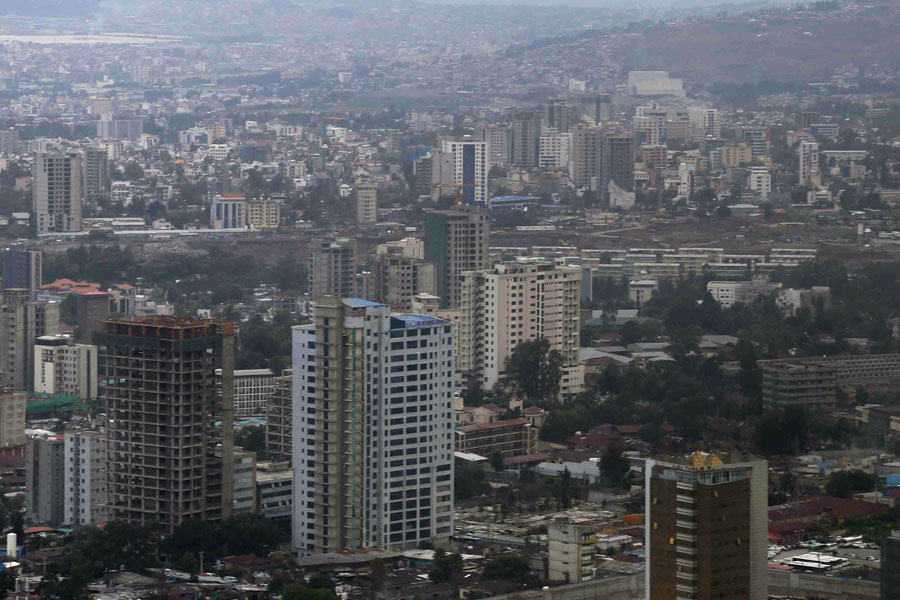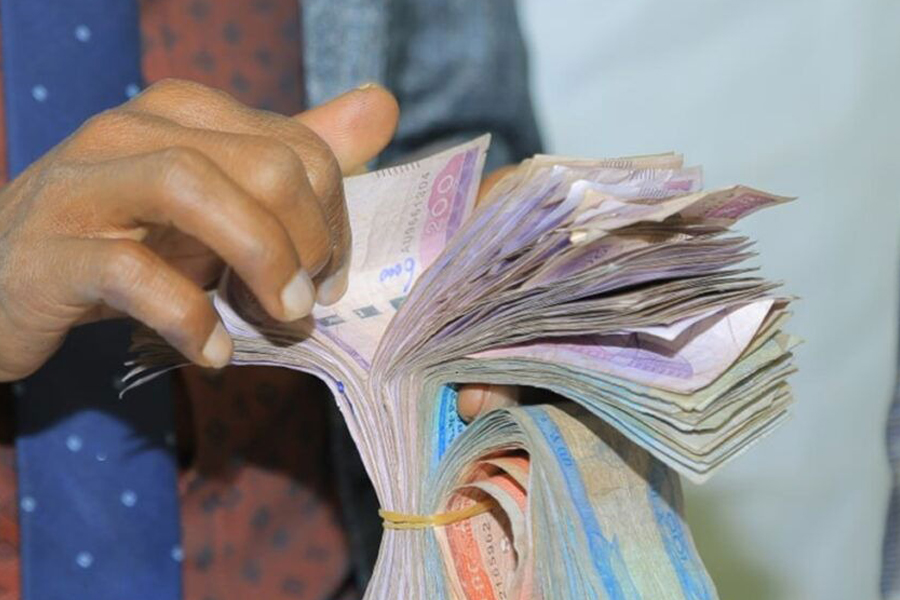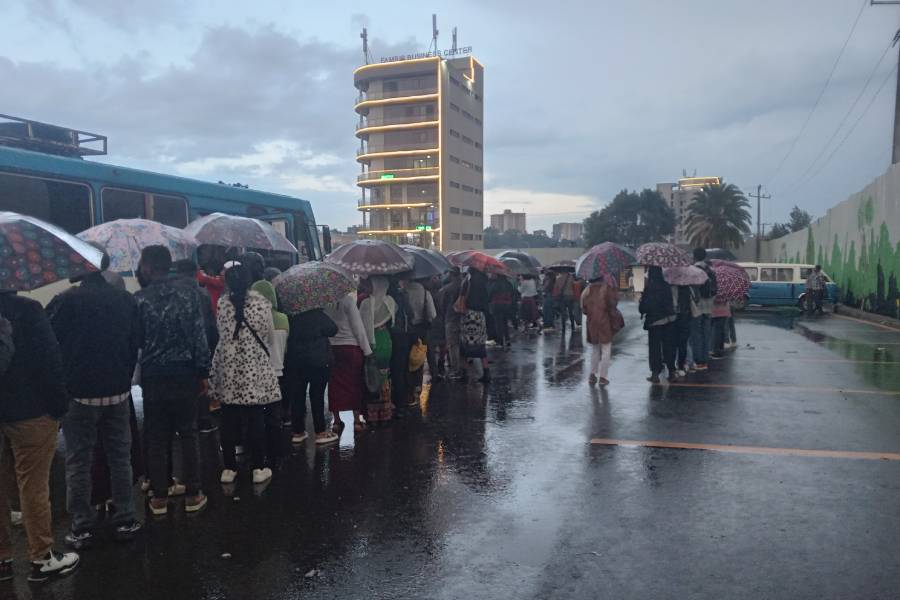
My Opinion | Apr 15,2023
Transport authorities placed blame on driving schools and vehicle inspection centres for a recent surge in traffic accidents. This comes as traffic penalties have doubled to over 1.1 billion Br in the past nine months. Officials attributed the revenue rise to stricter enforcement measures, including heightened supervision and a comprehensive digitisation of procedures. According to a performance report presented by the Road Safety & Insurance Fund Service to Parliament last week, nearly two million drivers were penalised for over nine million traffic violations.
Jemal Abaso, CEO of the Service, accused driving schools and technical inspectors of issuing driving permits without proper training and using equipment that was not calibrated accurately. He argued this contributed to poor driving habits and the high number of traffic accidents.
"They're producing killers," he boldly remarked.
Traffic accidents showed a positive trend, decreasing by around 532 in the first six months to 23,280 incidents, compared to last year. Property damages also declined by a third to around 1.06 billion Br. However, there was a 54pc increase in third-party insurance claims paid on property damage, reaching 689 million Br. Fatalities followed a similar downward trend, decreasing by 514 to around 1,358.
The CEO attributed the positive notes to a crackdown on driving schools and inspection centres. However, parliamentarians raised concerns about the reliability of the data collected at the national level, citing a three-month delay in the report. To emphasize the stricter enforcement measures, Jemal recalled the recent cancellation of permits for 10 driving schools (eight in Oromia and two in Benishangul-Gumuz regional states) and two technical inspection centres.
"Licenses are sold at some of these institutions," he said.
Jemal highlighted the upcoming launch of a national road accident data management system in collaboration with Ethio telecom. He said the system is expected to improve data quality and ensure timely reporting, providing a clearer picture of road safety.
The Standing Committee on Urban Infrastructure & Transport Affairs raised concerns about driving license issuance, citing reports of bribery for inadequately trained students. Fetia Dedgeba, the service's deputy CEO, proposed implementing standardised national guidelines for all driving schools would ensure consistent training quality while a digital point penalty system would enable stricter driver monitoring. She said establishing equipment standards at inspection centres will guarantee accurate vehicle assessments.
"Our latest traffic codes will be harmonised with neighbouring countries," she told Fortune.
According to Fetia, the overhaul of driver's license issuance through the Tripartite Transit and Transport Facilitation Program (TTTFP). This World Bank-backed initiative, integrating procedures with COMESA and SADC countries, will introduce new features.
Driver's licenses will incorporate biometric data for enhanced security and identification while vehicle data specifications will be linked to licenses, allowing for comprehensive driving history tracking along national borders.
A two-round campaign by the Service of random inspections on around 80,000 cars found 27pc were carrying beyond their capacity, 14pc did not meet minimum technical standards, and 16pc had faulty seatbelts.
Fetia expects speed limiters, which will soon become mandatory on public transport vehicles, to reduce accidents caused by overspeeding. She also foresees compulsory standards on technical inspection equipment, improving the quality of cars on the road.
With nearly 100,000 cars joining Ethiopia's roads annually, around 600 driving schools produce thousands of new drivers yearly for tests prepared by transport authorities.
Institutions contest the accusation.
According to Debebe Tenaw, manager at the 20-year-old Safety Driving School, over the three decades since driving schools became prominent, fatal accidents have demonstrably decreased. He said Ethiopia used to rank among the highest traffic fatalities recorded globally, with 136 deaths for 10,000 cars 26 years ago. Today, the average has plummeted to around 24 deaths per 10,000 cars.
"This is undeniable progress brought on by the schools," Debebe said.
He argues that blaming driving schools for accidents is illogical when the authorities themselves conduct the final testing process before issuing licenses and authorising renewals.
"Proper research would reveal that driving schools have played a positive role," he said.
Debebe believes regulators failed to delve deeper into the root causes of traffic accidents within the transport sector. He believes they rely on superficial analysis instead of conducting thorough investigations.
Transport researchers like Tebarek Lika (PhD) argue that the high number of traffic accidents compared to the number of cars emanates from undiversified transport options worsened by public perception.
He said the public needs to begin demanding better service from commercial transporters who overcrowd their vehicles for a quick buck, while the regulators need to improve internal control mechanisms to lower room for transactional relationships with drivers.
"The schools are a small part of the problem," he said. "A thorough change in attitude is important."
The report revealed that nearly 255,000 drivers were penalised in the past nine months across Addis Abeba, which had around 109 deaths, a tenth of the national amount, despite having almost a third of the 1.5 million vehicles in the country.
While concurring that some drivers obtain permits without adequate training, for a taxi driver Mezegebu Worku, the elevated earning from penalties reflects higher ticket prices and simplified payment options rather than enhanced control.
"There is no uniformity in practice," he told Fortune.
PUBLISHED ON
Apr 28,2024 [ VOL
25 , NO
1252]

My Opinion | Apr 15,2023

Fortune News | May 29,2023

Radar | Jul 29,2023

Agenda | Aug 04,2024

Editorial | Sep 01,2024

Radar | May 27,2023

Radar | Mar 18,2023

Delicate Number | Aug 13,2022

In-Picture | Sep 02,2024

Fortune News | Sep 10,2023

Dec 22 , 2024 . By TIZITA SHEWAFERAW
Charged with transforming colossal state-owned enterprises into modern and competitiv...

Aug 18 , 2024 . By AKSAH ITALO
Although predictable Yonas Zerihun's job in the ride-hailing service is not immune to...

Jul 28 , 2024 . By TIZITA SHEWAFERAW
Unhabitual, perhaps too many, Samuel Gebreyohannes, 38, used to occasionally enjoy a couple of beers at breakfast. However, he recently swit...

Jul 13 , 2024 . By AKSAH ITALO
Investors who rely on tractors, trucks, and field vehicles for commuting, transporting commodities, and f...

Oct 25 , 2025
The regulatory machinery is on overdrive. In only two years, no fewer than 35 new pro...

Oct 18 , 2025
The political establishment, notably the ruling party and its top brass, has become p...

Oct 11 , 2025
Ladislas Farago, a roving Associated Press (AP) correspondent, arrived in Ethiopia in...

Oct 4 , 2025
Eyob Tekalegn (PhD) had been in the Governor's chair for only weeks when, on Septembe...